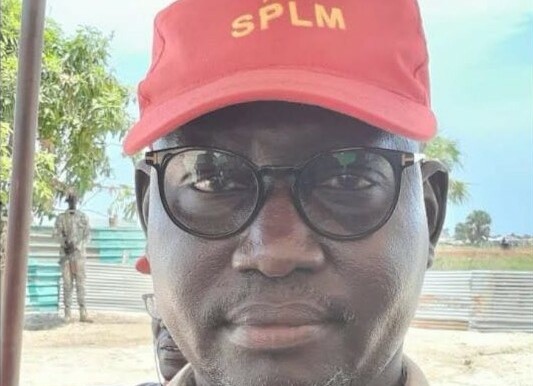A recent photo of Major General Lul Ruai Koang, the spokesperson for the Sudan People’s Defense Forces (SSPDF), wearing an SPLM (Sudan People’s Liberation Movement) Party cap has stirred up controversy.
The image has drawn criticism from the public and activists who see it as a breach of neutrality by the senior military official.
In the photograph, Gen. Ruai is seen wearing an SPLM Party cap at an official event and the action raised concerns about the impartiality and political alignment of the SSPDF. During the liberation struggle, the SPLA which was renamed the SSPDF, was the armed wing of the SPLM.
According to Edmund Yakani, the Executive Director of the Community Empowerment for Progress Organization (CEPO), Gen. Ruai’s wearing of the party cap violates the SSPDF Professional Code of Conduct for the Armed Forces, particularly Article 152(a) which emphasizes the need for the national army to maintain a clear distinction between military and partisan political functions.
“The official spokesperson of the SSPDF wearing the ruling party cap violates the Act for the establishment of the South Sudan People’s Defense Forces Article 151,” he underscored. “This article stresses that any member of the SSPDF, regardless of rank, must be non-partisan, professional, disciplined, and subordinate to civilian rule.”
As South Sudan strives for lasting peace and stability, it is crucial for all stakeholders, including military officials, to uphold principles of impartiality and professionalism in their roles.
“Firstly, he (Gen. Ruai) can issue a public apology for wearing the cap, which is the softer approach. Alternatively, the leadership may decide his fate, whether he continues as the SSPDF spokesperson or is replaced,” Yakani stated and added: “With all due respect, knowing him and his professionalism, I suggest he publicly apologizes for wearing the SPLM cap.”
Bol Deng Bol, the Executive Director of Intrepid South Sudan and Chairperson of the Jonglei Civil Society Network (JCSN), was one of the first to express disapproval. In a statement, Deng criticized the decision, stressing the importance of military officials remaining neutral and avoiding clear political affiliations.
“Lul Ruai Koang should serve one master; either the National Army or the SPLM,” he said.
Deng further pointed out that this behavior has resulted in significant politicization of the army, leading to vertical defections and counter-defections between the military and the political party.
However, not everyone shares Deng’s perspective. James Madut Adin, a netizen, defended Gen. Ruai on his Facebook page.
“SPLM and SPLA have never been separate since day one. Stop blaming army spokesperson Lul Ruai Koang for wearing the SPLM red cap,” he wrote.
Another observer, Rengu Thon, also weighed in and wrote, “While there is a connection between the army and the SPLM, the army’s main duty should be to protect the interests of citizens, not a specific political party. It is time to shift our mindset.”
When contacted for comment on the controversy he has stirred, Gen. Ruai curtly said, “I have no comment.”
As South Sudan navigates its intricate political landscape, this incident serves as a reminder of the delicate balance between individual rights and official responsibilities. The focus remains on Gen. Ruai whose choice of headgear has sparked broader discussions about the role of military figures in a supposedly democratic society.




